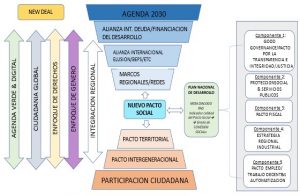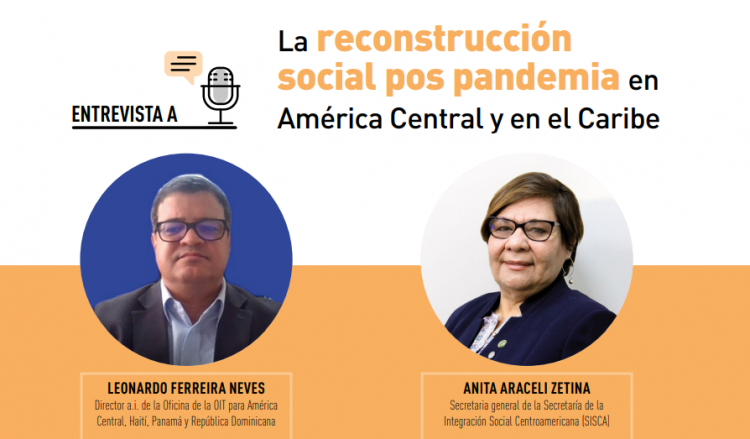Juan Manuel Santomé, EUROsociAL+ director

What great doctrine is there that is easy to expound?
Kakuzo Okakura (The Book of Tea)
This new issue of Reciprocally addresses the issue of new social pacts from very different points of view – emphasising the centrality of care and the gender perspective, democratic governance and the enabling conditions necessary to reach social pacts that reinforce democracy, expand rights and improve people’s trust in public institutions and highlighting the importance of employment and social protection in these new social pacts, with an analysis of the Economic and Social Councils as stakeholders of renewed relevance as spaces favouring a multi-stakeholder dialogue (government, civil society, the private sector, trade unions, academia etc.) All of this is necessary to reach sufficient consensus that can lead to new social pacts that allow us to tackle a truly inclusive and resilient post-COVID 19 recovery phase that does not leave anyone behind, as very correctly put forward in the 2030 Agenda for Sustainable Development.
In our opinion, this mainly concerns moving towards new pacts that make it possible to reduce inequality and improve social cohesion, allowing growth which is sustainable and environmentally friendly and enabling the broadening of peace and trust and the consolidation of democracy. The information available, as we know, is overwhelming. Today, Latin America continues to be the region of the planet with the greatest inequality as well as having the highest mortality from the pandemic (with only 9% of the world’s population, it accounts for about 30% of global COVID 19 mortality). We might therefore ask whether it is reasonable to propose the following correlation: the greater the inequalityà the less the social cohesionà, the greater the fragility of social pactsà the less resilience there is when facing a health pandemic, for example. The answer would be “Yes, possibly”.
At EUROsociAL we are convinced that strengthening social cohesion and reducing inequalities where possible continues to be – now more than ever – a global priority, particularly in the case of Latin America and the Caribbean. We therefore believe that now that there is a consensus on the need for new social pacts to address an inclusive and resilient construction and recovery phase, it is useful to share some reflections not only on WHAT type (conceptualisation of the new social pacts, a theme addressed by several of the articles in this issue of Reciprocally) but on HOW to do so. Some of the questions that arise naturally could be: 1) Can international cooperation contribute to the construction and creation of new social pacts? 2) Are there specific experiences and good practices of contributions to the construction of new social pacts in international cooperation in general and in EU/Latin American and Caribbean cooperation in particular? What lessons can be learnt?
Some short answers: 1) Can international cooperation contribute to the construction and creation of new social pacts? Yes, international cooperation has an important role to play in the development of new social partnerships for several reasons: (i) in today’s globalised world, any newly-minted national social pact will necessarily have to dialogue with the construction of international alliances and partnerships, a “global partnership for the provision of global public goods such as climate security, financial stability, peace, universal health – we have the example of the current pandemic – and so forth (regional and international solidarity is therefore key)”. (ii) More than ever learning from each other and the exchange of experiences are needed. Many of the current problems and challenges are shared and we are all committed to finding solutions together – international cooperation makes it possible to facilitate this mutual learning. (iii) In relation to the post-COVID 19 phase, the temporary “lag” in the pandemic between the EU and Latin American and Caribbean countries and of course within those Latin American and Caribbean countries, reinforces the relevance of the exchange of strategies and recovery plans, resulting in the exchange of experiences of special value. (iv) The pandemic has undoubtedly led to a reassessment of what is public (the state sector), and the important role of the State that once again occupies a central place not only in the recovery phase but in the medium and long-term development strategy. International cooperation provides the propitious ecosystem to favour the exchange of experiences between peers and public employees through technical assistance that acquires new relevance and interest. (v) International cooperation can assume a facilitating role in a multidimensional, multilevel and multi-stakeholder dialogue-country, with dialogue being essential to reach any agreement. (vi) International cooperation for development can play a key role in advancing policy coherence, aligning international trade agreements with the 2030 Agenda, optimising the social and cooperation aspects of such agreements etc.
Are there specific experiences and good practices of contributions to the construction of new social pacts in international cooperation in general and in EU/Latin American and Caribbean cooperation in particular? What lessons can be learnt? Yes, there are experiences that we believe are valuable in contribution cooperation to lay the foundations for future new social partnerships, to strengthen inter-sectoral coordination mechanisms, multidimensional, multilevel and multi-stakeholder dialogue spaces and to support public policy reforms that reduce inequality and improve social cohesion. We are of course referring to EUROsociAL as a possible example that is close at hand and it is relevant with regards the case in question. We might therefore propose that programmes such as EUROsociAL have contributed to laying the foundations for the creation of new agreements (some potential and others de facto) and above all that have proven to be useful (and viable) when adopting an inductive approach to furthering the debate around new social pacts. Inductive reasoning (making an inference based on an observation) means that it is possible to learn in order to advance the development of new social pacts from practice, from what is specific, from an environment as limited as the scope of action of a regional cooperation programme of the EU with Latin American and Caribbean countries. After 15 years on the frontline, accompanying multiple public policy reforms and improving social cohesion, a number of lessons have been learnt that may be useful at this time. To draw lessons from the specific to shed light on the global.
Due to space limitations, we are forced to synthesise some of these lessons in the following “map”:

| NEW DEAL | NEW DEAL |
| AGENDA 2030 | 2030 AGENDA |
| AGENCA VERDE & DIGITAL | GREEN & DIGITAL AGENDA |
| CIUDANÍA GLOBAL | GLOBAL CITIZENSHIP |
| ENFOQUE DE DERECHOS | HUMAN RIGHTS-BASED APPROACH |
| ENFOQUE DE GÉNERO | GENDER-BASED APPROACH |
| INTEGRACIÓN REGIONAL | REGIONAL INTEGRATION |
| ALIANZA INT. DEUDA/FINANCIACIÓN DEL DESARROLLO | INTERNATIONAL ALLIANCE DEBT/DEVELOPMENT FINANCING |
| ALIANZA INTERNACIONA ELUSION / BEPS / ETC | INTERNATIONAL ALLIANCE TAX EVASION/BEPS etc. |
| MARCOS REGIONALES / REDES | REGIONAL FRAMEWORKS/NETWORKS |
| NUEVO PACTO SOCIAL | NEW SOCIAL PACT |
| PACTO TERRITORIAL | REGIONAL AGREEMENT |
| PACTO INTERGENERACIONAL | INTER-GENERATIONAL AGREEMENT |
| PARTICIPACIÓN CIUDADANA | CITIZEN ENGAGEMENT |
| PLAN NACIONAL DE DESARROLLO | NATIONAL DEVELOPMENT PLAN |
| MESA DE DIÁLOGO | DIALOGUE EVENT |
| PAÍS | COUNTRY |
| Indicador calidad del Pacto Social | Social Pact quality indicator |
| Grado de COHESIÓNSOCIAL | Degree of SOCIAL COHESION |
| Componente 1: GOOD GOVERNANCE / PACTO POR LA TRANSPARENCIA E INTEGRIDAD / JUSTICIA | Component 1: GOOD GOVERNANCE/PACT FOR TRANSPARENCY AND INTEGRITY/JUSTICE |
| Componente 2: PROTECCIÓN SOCIAL & SERVICIOS PÚBLICOS | Component 2: SOCIAL PROTECTION & PUBLIC SERVICES |
| Componente 3: PACTO FISCAL | Component 3: FISCAL AGREEMENT |
| Componente 4: ESTRATEGIA REGIONAL INDUSTRIAL | Component 4: REGIONAL INDUSTRIAL STRATEGY |
| Componente 5: PACTO EMPLEO / TRABAJO DECENTEvsAUTOMATIZACIÓN | Component 5: EMPLOYMENT/DECENT WORK PACT vs. AUTOMATION |
A brief explanation (possibly very necessary) to guide your reading:
(a) Scope of the map to facilitate the gestation of new social pacts: the previous “map” is ordered into different levels and categories of analysis to serve as a guide in the process of building social partnerships that respond to society’s current challenges. It is based on a premise of global consensus – the need for a New Deal, an overarching global pact for an inclusive and resilient recovery which implies a commitment to mobilise financial resources and the abundant existing knowledge through alliances for development in line with INTPA’s commitment and what SDG17 proposes, leaving no one behind – the inspiring slogan of the 2030 Agenda for Sustainable Development.
(b) Essential components of the new social pacts: we have learnt that every social pact should address at least five components (box on the right of the map) to prove robust and have an impact: 1st component à A commitment to good, democratic governance and access to justice to enable conditions for all social pacts. Only in this way is it possible to restore people’s trust in institutions. 2nd component à The strengthening of social protection and access to quality public services. 3rd component à A fiscal pact as a cornerstone to facilitate the necessary redistribution of wealth and thus increase fiscal space, which includes eliminating the institutionalisation of the culture of privilege (ECLAC2020), eliminating tax evasion (amounting to $3.25 billion, 6.1% of regional GDP in Latin American and Caribbean countries) and increasing tax revenues. 4th component à A regional industrial strategy (productive model reform component with a commitment to diversification, regional economic integration, value chains, moving away from the agro-export model which is strongly dependent on global commodity prices etc); 5th component à An agreement to ensure decent employment and a reduction of informality within a scenario of increasing automation.
(c) The importance of National Development Plans: we have learnt that the previous components, which are necessary to advance towards a new social pact, have to be implemented as National Development Plans (NDPs) as the central guiding tool of a country’s efforts towards sustainable, democratic and inclusive development.
(d) Commitment to Policy Dialogue: we have seen that a commitment to policy dialogue is the way to achieve NDPs that contain vectors which generate conditions for new social pacts and that international cooperation, in our case through EUROsociAL, can effectively fulfil the aforementioned facilitating role when rolling out a multi-dimensional, multi-level and multi-stakeholder dialogue.
(e) Social Cohesion as an optimal indicator of the quality of Social Pacts: We also passionately believe that the degree of social cohesion of a society/country is a significant indicator in assessing the quality of current social pacts and the effectiveness of the new emerging pacts. Social cohesion based on the rights approach and expressed in its twin meaning: objective (the reduction of inequality gaps) and subjective (a sense of belonging, the degree of trust between people and within institutions).
(f) The regional and international dimensions of social pacts: we have learnt that every advance that a country makes towards a new social pact cannot be “encapsulated” in the national sphere but must come into “dialogue” with a series of international and global dimensions that, on our map, we have placed above the new social pacts (at the heart of the map) in the blue inverted pyramid. (i) As an EU-Latin America and the Caribbean regional cooperation programme, we have confirmed the importance of the regional dimension and the relevance of multi-country regional frameworks and consensus and that of thematic networks. These regional consensuses have frequently been allowed to decline into national reforms of public policies while the networks and common frameworks have contributed to moving towards greater regional integration. Regional framework agreements have made it possible to shield great advances for social cohesion from the normal rotation of governments. (ii) We have also repeatedly verified the direct correlation between National Development Plans (NDPs), social pacts and the relevance of international anti-tax evasion alliances (against well-known tax havens) and the crucial importance of the international alliance for external debt relief for developing countries and the global agreement in favour of development financing etc. (all aspects that exceed the national sovereignty of any country but with structural stakeholders in making any social pact for democratic and inclusive change viable). (iii) Above all, we locate the 2030 Agenda, that civilising agenda which encourages us to comply with 17 SDGs and which commits us all to sustainable development and leaves no one behind. Can any emerging social pact obviate this agenda? We have learnt that there is an enormous challenge in linking national agendas with regional and global agendas and that international organisations, and the commitment to multilateralism, is the only way to do it with the required coherence.
(g) The territorial and participatory dimensions of social pacts: we have repeatedly verified that it is not possible to contribute to the improvement of social cohesion with purely top-down public policies (from central government). Reform policies have to be implemented from the territories (bottom-up). For this reason, the advancement of new social pacts has to incorporate a multi-level and therefore territorial dimension as well as a decided commitment to citizen participation (in our map, these levels and categories are presented in the orange descending pyramid). We clearly link citizen participation to the territory, which means also emphasising the option of a multi-stakeholder approach, which includes local governments, civil society etc.
(h) The key cross-cutting dimensions for new robust and inclusive social pacts: Finally, we have repeatedly verified that it is not possible to contribute to an improvement in social cohesion (and therefore, to the creation of quality social pacts) if a decided multidimensional approach is not adopted. EUROsociAL is designed by placing multi-dimensionality at its centre, comprehensively organising its areas of democratic governance, gender and social policies, facilitating multidimensional public policy dialogues through the aforementioned Country Dialogue Tables. However, in order to complete the map of keys and dimensions to take into account if we are to facilitate the emergence of new social pacts, it is necessary to include a series of cross-cutting vectors that must be incorporated (we place them on the left in vertical arrows): (i) A human rights-based approach: a key commitment that ensures that new social pacts are inclusive, robust and coherent. A human rights-based approach, as is well known, is a conceptual and action framework for human development that is based on the norms and principles of international human rights law and is oriented towards their promotion and protection. Under this approach, development plans, policies and processes are built on a system of rights and their corresponding duties established in international law. (ii) A gender-based approach: it is essential to place the gender approach at the centre of the construction of new social pacts so that they include women – 50% of the population. Due to their multiplier effect as a generator of social cohesion, they reduce inequalities, strengthen democracy and citizen participation, the construction of a welfare state and social protection systems based on the logic of care etc. (iii) Just Transition/Environment: a green agenda that is committed to progressive decarbonisation and a bringing about a change in the production, consumption and energy model that is essential as a civilising horizon. From our area of action, we mainly advocate that this transition in model be fair and undertaken without anyone being left behind, under the criteria of inclusiveness and equity. (iv) Digital agenda: this is also to ensure the deployment of the digital agenda ensuring a reduction in the digital divide, the accessibility of ICT (according to ECLAC data to date, more than 40 million households lack connectivity in the region). (v) Global Citizenship: reinforcing the commitment to the construction of new people-centred social pacts which operate as devices that guarantee the participation of an active citizenry, with engagement as a show of the commitment to the resolution of common conflicts. (vi) Regional Integration: EUROsociAL, as part of the EU’s regional cooperation effort with Latin American and Caribbean countries, is undoubtedly contributing, however modestly, to the regional integration process, weaving together networks, institutional partnerships, facilitating consensus at the regional level, etc. Nevertheless, a political commitment in favour of regional integration as a key vector to embrace the new social pacts is clearly more pertinent than ever (thus overcoming national limitations, joining forces for a resilient post-COVID 19 recovery, improving negotiating positions in the global arena in terms of access to development finance or debt relief etc.)
Someone once said “There is no treasure map, the treasure is the map”. In the uncertain times in which we live, compasses and maps are just what we need to guide us along the way. We do not accept short cuts or simplifications. Let us take on the complexity of the task before us, because it is possible to carry it out. Above all, because it is necessary to do so.



